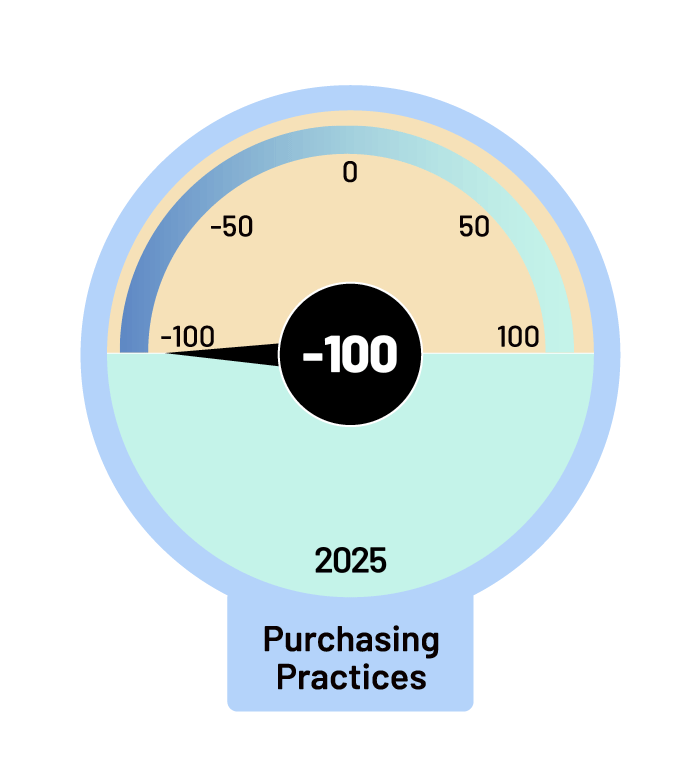
Industry Purchasing Practices
Purchasing Practices Industry Score
The Industry We Want Purchasing Practices Metric assesses the state of purchasing practices across the garment sector, using data gathered through the Better Buying Partnership Index™ (BBPI). Through this annual survey, suppliers rate their buyer’s purchasing practices, providing valuable insights into the industry’s progress towards adapting responsible purchasing practices.
In the latest survey, which gathered over 1,000 supplier responses, the Purchasing Practices Metrics scored 52, improving from 48 in 2024, 40 in 2023 and 39 in 2022.
The survey, circulated in October and November 2024, received 1,341 responses from suppliers across 56 countries in the garment sector. Of those responses, 65% of behaviours were considered those of a true partner, 22% were the behaviours of a collaborator and 13% of behaviours were the behaviours of a detractor.
Our Approach
Many of the commitments made by both brands and factories rely on responsible purchasing practices, which provide the necessary space and financing for improvements- particularly related to brand code of conducts.
In order to ensure broad and inclusive assessment, we invited manufacturers across the globe to participate in the most accessible industry-wide supplier feedback survey.
With each iteration published, we aimed to confirm the previous year’s benchmark and re-assert the findings that we see from the current year.
Key Insights and Industry Impact
Growing awareness and implementation of responsible purchasing practices- especially among brands associated with MSIs like Fair Wear, the Ethical Trading Initiative (ETI), and Cascale , which has led to a rise in the purchasing practices score.
The vast majority of suppliers (79.4%) are rating brands they consider preferred partners. This means that the results reflect industry best practice, rather than industry norm. Indeed, while the score offers valuable insights, it may not fully reflect the realities and challenges faced by suppliers, workers and the broader industry. To gain a more comprehensive and accurate depiction, further supplier participation and continuous assessment is crucial.
Our Partner
Better Buying™ is an online rating system created to highlight areas for improved purchasing practises. Better Buying™’s overarching goal is to support the industry-wide transformation of buyer’s purchasing practises so that business relationships support buyers and suppliers in achieving their social, financial and environmental sustainability goals.
Questions?
-
The BBPI is a short, accessible survey for manufacturers to answer about their relationships with their brand partners. It contains just 15 questions and requires only 5 - 10 minutes to complete for each of their brand partners. All entries will contribute to a final score for the sector, as well as brand specific-results that can be accessed through subscription. The larger score for the sector will be used by TIWW to act as an annual “temperature check” on purchasing practices in the garment and footwear industry.
For brands, this information will provide direct feedback from your suppliers on purchasing practices. This is valuable information that can be used to build better relationships with suppliers, understand how/what processes need to improve internally and provide a basis for work on social and environmental sustainability.
Suppliers’ feedback will be shared anonymously and will help provide the industry with an idea of the current state of purchasing practices worldwide.
-
The PPA for suppliers is part of ACT’s Purchasing Practices Self-Assessment programme. The PPA seeks to reveal whether the self assessments by ACT member brands match the experiences of their suppliers. The BBPI aims to collect an industry wide data set to gather a general score of the experiences of manufacturers in the sector on purchasing practices. As such, participation in the survey is open to all suppliers, and not exclusively to suppliers of brands participating in particular initiatives/MSIs.
-
The CFRPP is a reference point and aims to set the standard for responsible purchasing practices in the garment industry. TIWW seeks to show an annual temperature check of the industry, including purchasing practices. The metric for TIWW purchasing practices is powered by the data from the BBPI survey.
The framework and the initiative are interrelated, complementary, yet, also distinct in their approach and aim. The BBPI’s questions cover all of the topics in the CFRPP on a general level. However, its goal is to collect reflections of suppliers' subjective experience on the impact of brand partners' purchasing practices on their operations. As such, the survey is not a checklist to gather feedback on your performance on each of the principles and the more detailed groundwork and progress practices of the CFRPP. The survey also goes further in posing questions related to brand behaviour on monitoring and remediating worker complaints.
For brands seeking to integrate the CFRPP into their systems and purchasing practices, it is encouraged to engage with TIWW’s metric on purchasing practices, and also consider participating in the more comprehensive Better Buying Purchasing Practices Index™ (BBPPI) to obtain supplier feedback on their practices. Supplier feedback is a crucial element in evaluating and improving purchasing practices. However, evaluation of a brands’ purchasing practices should not be limited only to supplier feedback.



